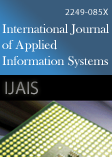
- Isiaka Rafiu M. and Omidiora Elijah O and Olabiyisi Stephen O and Okediran Oladotun O 2014. Mamdani Fuzzy Model for Learning Activities Evaluation. International Journal of Applied Information Systems. 7, 3 (May 2014), 1-8. DOI=http://dx.doi.org/10.5120/ijais451155
-
@article{10.5120/ijais2017451568, author = {Isiaka Rafiu M. and Omidiora Elijah O and Olabiyisi Stephen O and Okediran Oladotun O}, title = {Mamdani Fuzzy Model for Learning Activities Evaluation}, journal = {International Journal of Applied Information Systems}, issue_date = {May 2014}, volume = {7}, number = {}, month = {May}, year = {2014}, issn = {}, pages = {1-8}, numpages = {}, url = {/archives/volume7/number3/627-1155}, doi = { 10.5120/ijais14-451155}, publisher = { xA9 2013 by IJAIS Journal}, address = {} } -
%1 451155 %A Isiaka Rafiu M. %A Omidiora Elijah O %A Olabiyisi Stephen O %A Okediran Oladotun O %T Mamdani Fuzzy Model for Learning Activities Evaluation %J International Journal of Applied Information Systems %@ %V 7 %N %P 1-8 %D 2014 %I xA9 2013 by IJAIS Journal
Abstract
The intent of this paper is to determine the extent to which fuzzy model could suitably modelled learner activities in E-learning system. However, the paucity of public dataset that meet the exact requirement of this work poses challenges, which necessitate dataset simulation. The detail approach used for the dataset simulation and the fuzzy model were discussed. Construction of the Inference Mechanism using the Relational Calculus and Mamdani approaches were demonstrated. The performance of the simulated model in MATLAB was measured using classifier uncertainty and confusion based metrics. The Mean Absolute Error (MAE) is 10. 45; Root Mean Square Error (RMSE) is 8. 71. The result shows that Fuzzy logic (White-Box Model) has a low classification error and invariably a higher accuracy for estimating learner activities. Subsequently, the result obtained shall be revalidated using live data of students' activities in an online course. Furthermore, the current Mamdani's model performance shall be compared with its equivalent Neuro_Fuzzy Model. The more efficient of the two models shall be the choice for integration into an Open Source Learning Management System for automatic learning activities evaluation.
References
- Ardil, E. , and Sandhu, P. S. 2010. A soft computing approach for modeling of severity of faults in software systems. International Journal of Physical Sciences. 5(2), 74-85. Retrieved from http://www. academicjournals. org/IJPS.
- Babuska, R. 2001. Fuzzy systems, modeling and identification. Technical report, Delft University of Technology. Netherland.
- Challagulla, V. , Bastani, F. , Yen, I. , and Paul, R. 2005. Empirical assessment of machine learning based software defect prediction techniques. 10th IEEE International Workshop on Object-Oriented Real-Time Dependable Systems. WORDS 2005. 263-270.
- Devendra, K. C. 2010. Modeling and simulation of system using MATLAB and SIMULINK. CRC Press, Taylor & Francis Group, Boca Raton.
- Garson, D. G. 2010. Creating simulated datasets. Statistics Associates Publishing- Blue Book Series, 274 Glenn Drive, Ashebro, NC 272905 USA. Retrieved from www. statisticsassociations. com
- Liang, J. 2010. Data simulation: create a dummy dataset using clinical administrative database. Technical Report, Canadian Institute for Health Information.
- McCalla G. , and Champaign, J. 2013. AIED 2013 simulated learners workshop. Artificial Intelligence in Education, Lecture Notes In Computer Science. 7926, 954-955
- Omidiora, E. O, Olabiyisi, S. O, Okediran, O. O. , and Isiaka, R. M. 2013. Learner activities evaluation model: A neuro-fuzzy approach. International Journal of e-Education, e-Business, e-Management and e-Learning. 3(5), 421-424
- Open Mx Project. 2013. Open Mx- Advanced structural equation modeling. Retrieved from openmx. psyc. virginia. edu
- Switzer, D. 2013. Simulation using Excel: tricks, trial and trends. Retrieved from https://sites,google. com/site/dennissweitzer/home
- Vanlehn, K. Ohlsson, S. , and Nason, R. 1994. Applications of simulated students: An exploratory. Journal of Artificial Intelligence in Education, 5(2), 135-175
- Yildiz, O. , Bal, O. , and Gulsecen, S. 2013. Improved fuzzy modelling to predict the academic performance of distance education students. The International Review of Research in Open and Distance Learning. 14(5), 144-164
Keywords
Learner Activities, Simulated Dataset, Relational Calculus and Fuzzy Logic.

 10.5120/ijais14-451155
10.5120/ijais14-451155
